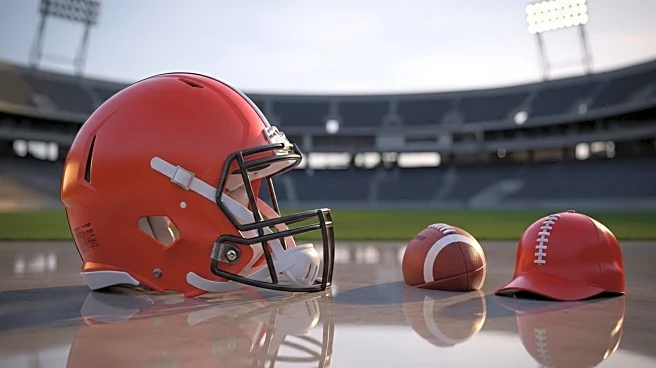What's Happening?
The Cleveland Browns are facing a challenging season with veteran quarterback Joe Flacco at the helm. Currently, the team is 0-2, and Flacco, at 40 years old, is not seen as the long-term solution for the Browns. ESPN insider Jeremy Fowler reports that while Flacco remains the starter for now, the team is likely to pivot to rookie quarterback Dillon Gabriel if the current situation does not improve. Gabriel, known for his mobility, could provide a spark to the Browns' offense, which has struggled in the early part of the season. During a recent game against the Baltimore Ravens, Gabriel entered the game and successfully led a touchdown drive, showcasing his potential to contribute positively to the team.
Why It's Important?
The potential shift to Dillon Gabriel as the starting quarterback is significant for the Cleveland Browns as it represents a move towards building for the future. Gabriel's mobility and fresh perspective could invigorate the team's offensive strategy, offering hope to fans and stakeholders looking for improvement. This transition could also impact the team's dynamics, as younger players often bring new energy and adaptability. For the Browns, who have struggled in recent seasons, finding a reliable quarterback is crucial for long-term success and competitiveness in the NFL.
What's Next?
If the Browns continue to struggle, it is likely that Dillon Gabriel will be given more opportunities to prove himself as the starting quarterback. The team's management will closely monitor Flacco's performance and make decisions based on the team's needs and Gabriel's readiness to take on a larger role. Fans and analysts will be watching closely to see how Gabriel performs in upcoming games, and whether he can lead the Browns to a turnaround in their season.
Beyond the Headlines
The decision to potentially start Dillon Gabriel also highlights the broader trend in the NFL of teams investing in younger talent to secure long-term success. This move could influence other teams facing similar situations to consider transitioning to rookie players who can offer new strategies and energy. Additionally, it underscores the importance of adaptability and innovation in professional sports, where teams must constantly evolve to remain competitive.









